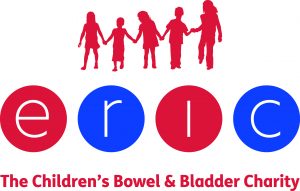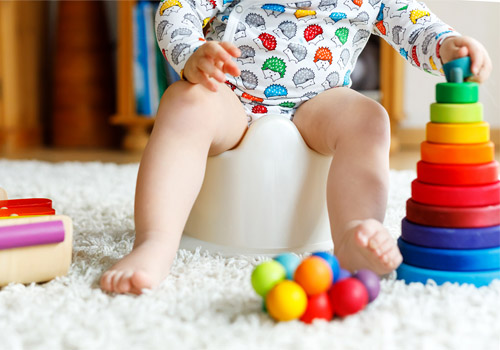Common toilet training issues facing early years practitioners
By Natalie Thompson, Helpline Advisor for ERIC – The Children’s Bowel & Bladder Charity
22nd August 2018
Share this entry:
Being toilet trained is a skill that children need to develop independence, self-esteem and confidence to thrive at school. Ofsted guidelines state that every child should be able to go to the toilet independently by the age of five.
However, it’s a developmental milestone that can create stress for families – particularly those experiencing challenging social or economic circumstances. It’s also a neglected area of training for many professionals working with pre-school aged children.

In 2016, ERIC, The Children’s Bowel and Bladder Charity surveyed almost 700 education staff working with children between the ages of three and seven. 70% said more children are now starting school without being toilet trained compared to five years ago, and this increased to 100% of staff working with children aged three to five*.
Toilet training in early years settings can be a tricky issue for EYPs to navigate with parents, and children can end up caught in the middle. Managing expectations, agreeing where boundaries and responsibilities lie, even starting a conversation with parents on this subject can be daunting and challenging. How can EYPs help support children and their families so training goes as smoothly as possible for everyone involved?
Communication is key
A toileting policy is the best way of making sure staff know the procedures they should be following. Sharing this policy and encouraging open, regular communication between parents and the setting helps to remove any ambiguity. Talking about preparing to toilet train with the family from 18 months gives the setting an opportunity to outline expectations.
Assessing readiness
Being able to assess a child’s readiness, knowing how our bowel and bladder works and how to keep them healthy are all vital for supporting children.
A consistent approach to training at home and in the setting, including language used and deciding when to go nappy free make things easier for the child. It is helpful to have best practice resources about toilet training that the setting can share with parents, such as ERIC’s Guide to Potty Training.
ERIC’s top tips for EYPs:
- Constipation is very common in young children and can make toilet training really challenging. Being able to spot the signs of a problem and signpost parents for help and support (through ERIC, their GP or health visitor) can make a big difference.
- Lots of children only want to poo in a nappy or start to withhold poo when they start training. ERIC has a step by step guide to help a child in this situation.
- Think about the toilet environment – children need to feel relaxed to go! Make them a pleasant place to be with books, bubbles, posters, singing songs etc.
- Use toilet seats and footstools to help children feel secure and get into a good squat position (feet supported, knees higher than hips).
- Encourage boys to sit down to wee so that they empty their bladder fully. This also provides opportunities to poo that can be missed when standing.
- Avoid encouraging children to empty their bladders too often – this can get very boring for them and doesn’t allow their bladder to fill properly or learn to hold more. On average children should be able to go 1.5 – 2 hours between wees.
- Work with the body’s natural, prime pooing time e.g. 20 – 30 minutes after eating. Encourage a sit on the potty or toilet after lunch and not before!
- Make sure children have a drink at regular intervals throughout the day. This will help them to recognise their bladder signals as well as keeping their stools soft.
- Always reward effort and not just success!
For further support or information about children’s bowel and bladder health, visit www.eric.org.uk.
*Survey of 699 school staff by ERIC and Association of Teachers and Lecturers, summer 2016.
Why attend Childcare Expo?
Join over 2,500 like-minded individuals from the early years sector who are dedicated to improving both practice and their childcare settings.
Attend educational seminars to credit your CPD
Meet the experts to have your questions answered
Receive fantastic onsite offers and discounts
Experience expert-led informative hands-on workshops
Network with peers and industry players
Pick up hundreds of new product ideas and services
And most of all, enjoy a great day out with your colleagues





